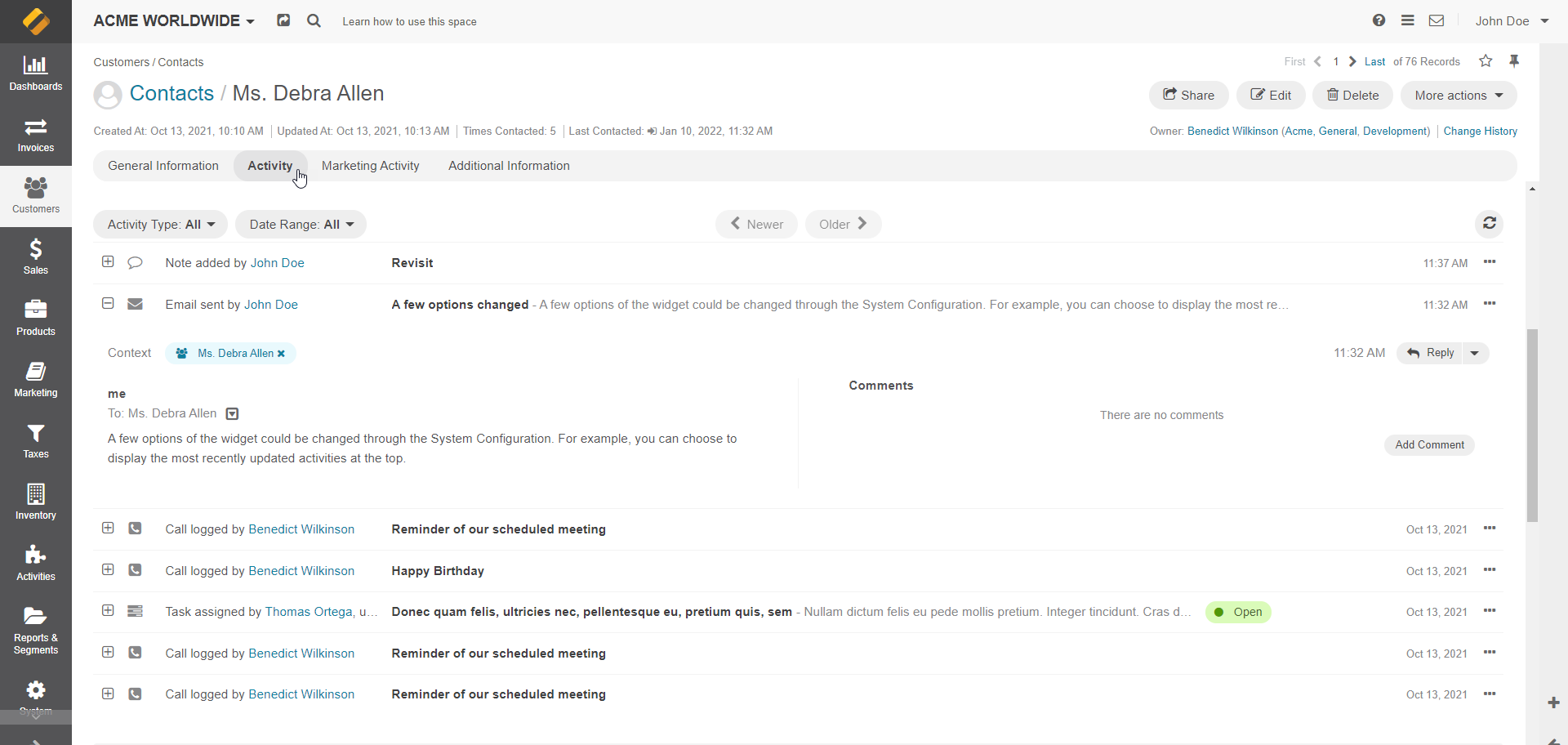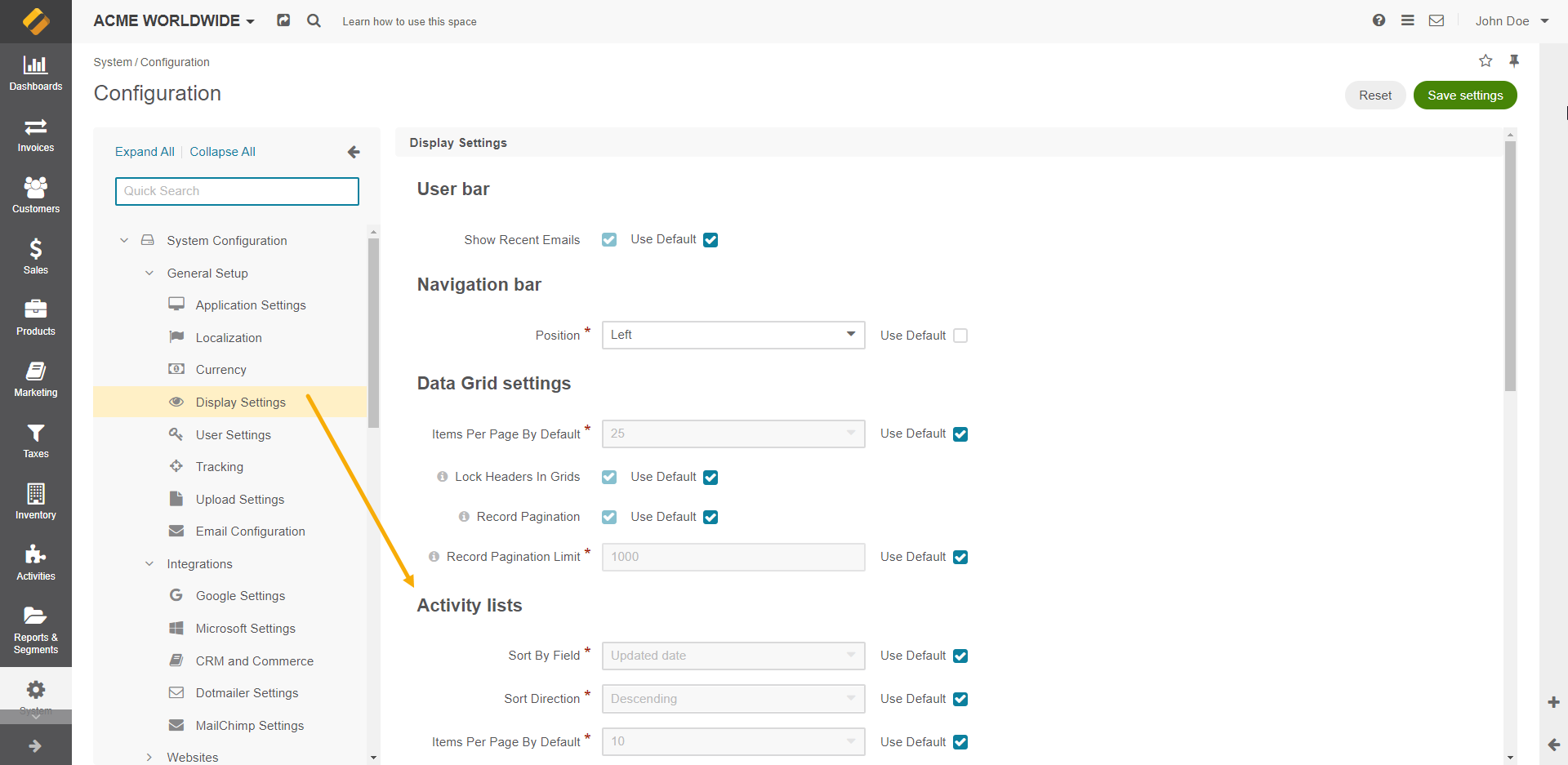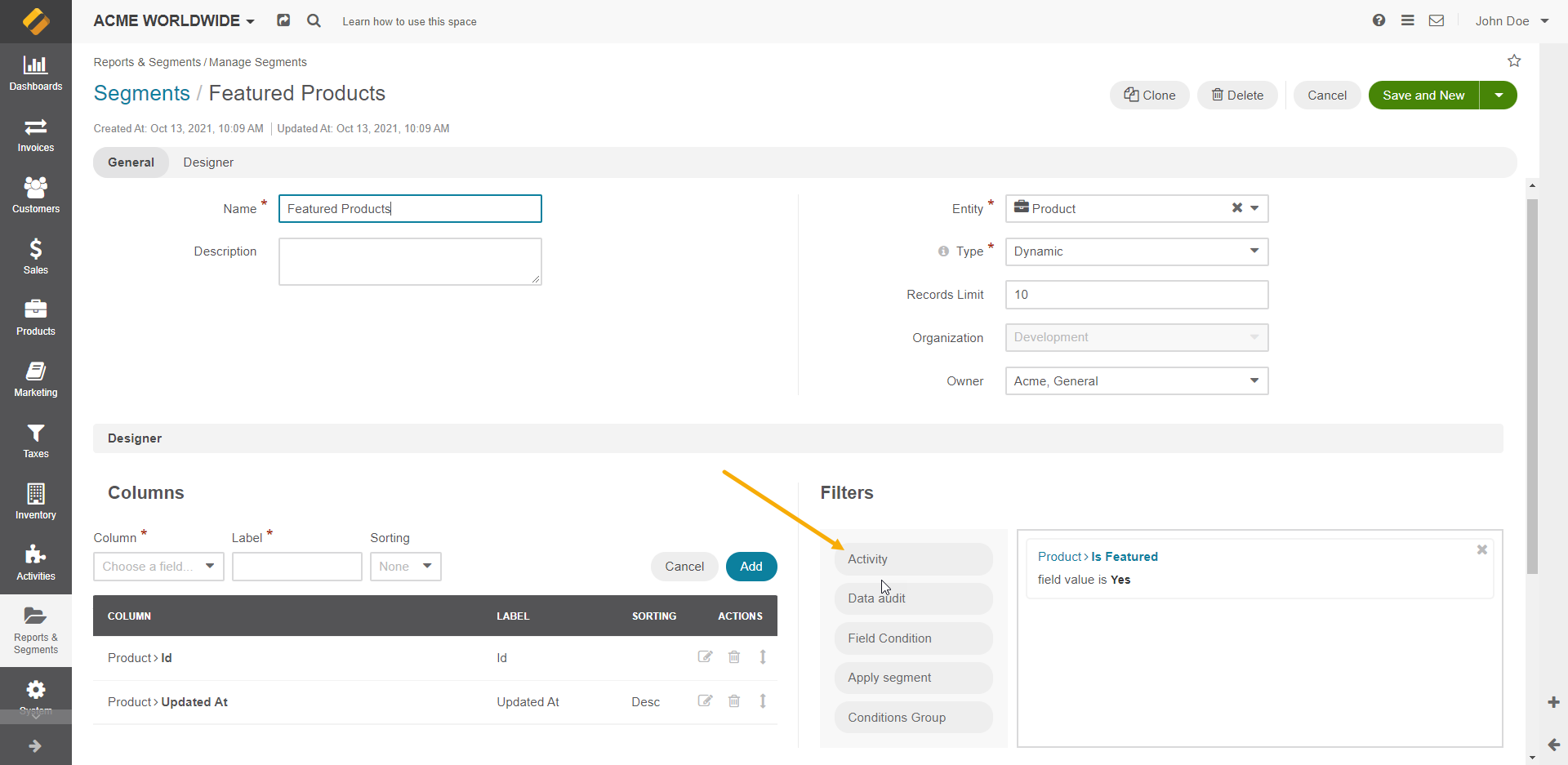Important
You are browsing documentation for version 5.0 of OroCommerce. Support of this version ended in January 2025. Read the documentation for version 6.1 (the latest LTS version) to get up-to-date information.
See our Release Process documentation for more information on the currently supported and upcoming releases.
OroActivityListBundle
OroActivityListBundle adds a widget to the entity view page. The widget displays a list of activities related to the entity record in chronological order. It also enables widget configuration in the system configuration section.
You can add the following activities to other entities:
Call
Task
Email
Calendar event
Notes
Visualization of the Activity list is defined as a widget block. It shows activities related to the entity record currently being viewed in a single list, with the ability to filter it by activity type (multiselect) and date (daterange filter).
Each activity row shows basic information: the activity type, who and when created, and updated it. You can also access the full activity record with the help of the “expand” action. By default, it displays 10 records, sorted by the Update date in descending order. You can change limitation and sorting in the UI via system configuration.
The widget is currently displayed in the Activities placeholder block on the view page of an entity.
The following screenshot is an example of a widget on a contact page:

Add Widget to a Page
A widget is usually rendered in the view_content_data_activities placeholder. However, if you need to extend it or use a view template different from @OroUI/actions/view.html.twig, you have to define a placeholder in it. For example:
{%- set activitiesData -%}
{% placeholder view_content_data_activities with {entity: entity} %}
{%- endset -%}
{% set dataBlocks = dataBlocks|merge([{
'title': 'Title',
'subblocks': [{
'spanClass': 'empty',
'data': [activitiesData]
}]
}]) %}
Register a New Entity
To add a new entity to be displayed within a widget, register a service that implements ActivityListProviderInterface and tag it as oro_activity_list.provider. A working example of this is available in EmailBundle or CalendarBundle, for example:
oro_calendar.activity_list.provider:
class: Oro\Bundle\CalendarBundle\Provider\CalendarEventActivityListProvider
arguments:
- '@oro_entity.doctrine_helper'
- '@doctrine'
tags:
- { name: oro_activity_list.provider, class: Oro\Bundle\CalendarBundle\Entity\CalendarEvent, priority: 50 }
This will add your provider class into providers (ActivityListChainProvider) that will be invoked to fetch data ordering by priority (added in service definition). Priority is helpful for future implementations or when you override existing providers in third-party bundles.
Each activity entity has its own row template for the UI component. Although you can place it anywhere you want, make sure its path is returned in the Provider via the getTemplate() method. For instance:
class CalendarEventActivityListProvider implements ActivityListProviderInterface
{
...
/**
* {@inheritdoc}
*/
public function getTemplate()
{
return '@OroCalendar/CalendarEvent/js/activityItemTemplate.html.twig';
}
...
Change Sorting and Limitation in Configuration
You can change sorting and limitation in the UI under System > Configuration > Display Settings > Activity Lists.
Option |
Description |
|---|---|
Sort By Field |
Sorts activity records by the date when they were created or by the date when they were updated for the last time. |
Sort Direction |
Sorts records in the ascending or descending direction. |
Items Per Page By Default |
Sets how many records appear on one page of the Activity section grids. |

Configure Permissions
Each activity entity must contain a provider (for example, EmailActivityListProvider) with the implemented ActivityListProviderInterface interface. The ActivityList::getActivityOwners method returns one or many ActivityOwner entities, which are connected to their activity list entity.
Filter Activities in Segments
ActivityListBundle extends OroSegmentBundle with the Activity filter type.
This filter can be used to filter records if they:
have an activity with a value in the field (e.g., a Contact who has an activity “Email” where the subject of the email contains text “Re:”)
do not have an activity with a value in the field (e.g., Contact who does not have activity “Email” where the subject of the email contains text “Meeting”)
If you select only one activity type in the filter, you can filter based on any field of the activity.
If you select more than one activity type in the filter, you can filter based on fields “updatedAt”, “createdAt” of the selected activities.

Add Inheritance of Activity Lists to the Target Entity
You can add inheritance of activity lists to the target entity from some related inheritance target entities.
It means that in target entities, you can see all activity list from the general entity and related entities.
To enable this option, configure the target entity to identify all inheritance target entities: use migration extension to add all necessary configurations to the entity config.
The following is an example of the migration to enable the display of contact activity lists in the appropriate account:
class InheritanceActivityTargets implements Migration, ActivityListExtensionAwareInterface
{
/** @var ActivityListExtension */
protected $activityListExtension;
/** {@inheritdoc} */
public function setActivityListExtension(ActivityListExtension $activityListExtension)
{
$this->activityListExtension = $activityListExtension;
}
/** {@inheritdoc} */
public function up(Schema $schema, QueryBag $queries)
{
$activityListExtension->addInheritanceTargets($schema, 'orocrm_account', 'orocrm_contact', ['accounts']);
}
}
Method parameters:
addInheritanceTargets(Schema $schema, $targetTableName, $inheritanceTableName, $path)
string $targetTableName - Target entity table name
string $inheritanceTableName - Inheritance entity table name
string[] $path - Path of relations to target entity